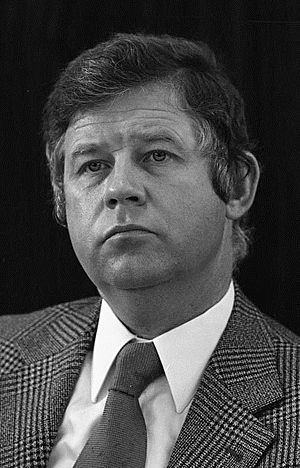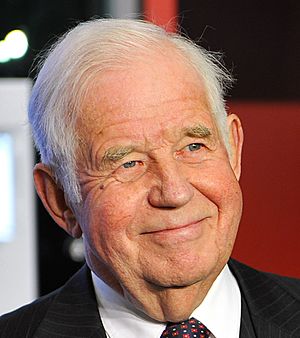Kurt Biedenkopf facts for kids
Quick facts for kids
Kurt Biedenkopf
|
|
|---|---|

Biedenkopf in 1973
|
|
| Minister President of Saxony | |
| In office 8 November 1990 – 18 April 2002 |
|
| President | Richard von Weizsäcker Roman Herzog Johannes Rau |
| Chancellor | Helmut Kohl Gerhard Schröder |
| Succeeded by | Georg Milbradt |
| Secretary General of the Christian Democratic Union | |
| In office 1973–1977 |
|
| Leader | Helmut Kohl |
| Preceded by | Konrad Kraske |
| Succeeded by | Heiner Geißler |
| Member of the Bundestag | |
| In office 14 December 1976 – 4 November 1980 |
|
| In office 18 February 1987 – 9 November 1990 |
|
| Personal details | |
| Born | 28 January 1930 Ludwigshafen am Rhein, Bavaria, Germany |
| Died | 12 August 2021 (aged 91) Dresden, Saxony, Germany |
| Education | |
Kurt Hans Biedenkopf (born January 28, 1930 – died August 12, 2021) was an important German lawyer, university professor, and politician. He was a member of the Christian-Democratic Union (CDU) party. He also served as the head, or rector, of the Ruhr University Bochum.
Biedenkopf started his political career in the German state of North Rhine-Westphalia. After Germany became one country again in 1990 (called German reunification), he became the first Minister President of the state of Saxony. He held this top job from 1990 until 2002. He was also the 54th president of the Bundesrat, which is like Germany's second parliament. He led the Bundesrat when it moved from Bonn to Berlin. Many people saw Biedenkopf as a key thinker for the CDU party when Helmut Kohl was the leader of Germany.
Contents
Early Life and Education
Kurt Biedenkopf was born in Ludwigshafen am Rhein, Germany. His family later moved to Schkopau. He studied political science in the United States at Davidson College and Georgetown University. Then, he studied economics and law in Germany at the University of Munich. He earned his law doctorate degree in 1958. He also got a Master of Law degree from Georgetown University in 1962.
In 1963, Biedenkopf finished his advanced studies at Goethe University Frankfurt. He became a teacher at the Ruhr University Bochum in 1964. By 1967, he was chosen to be the rector (head) of the university. At that time, he was the youngest person to lead a university in West Germany. He also taught at other universities, including Goethe University Frankfurt and Leipzig University.
Political Journey
Starting in National Politics
Kurt Biedenkopf joined the Christian-Democratic Union (CDU) party. His professional political career began in 1973 when he became the party's secretary general. This was under the leadership of the party chairman, Helmut Kohl. Biedenkopf left this role in 1977 because he had different ideas from Kohl. He then became one of Kohl's main rivals within the party.
From 1977 to 1983, he was a deputy chairman of the CDU in Germany. He was also a member of the Bundestag, which is the German parliament. He served in the Bundestag from 1976 to 1980 and again from 1987 to 1990.
Leading in North Rhine-Westphalia
In 1980, Biedenkopf ran for the top job in the state of North Rhine-Westphalia. He tried to become the Minister-President but did not win against Johannes Rau. Biedenkopf was the chairman of the CDU party in North Rhine-Westphalia until 1987. This was the largest part of the CDU party.
Becoming Minister-President of Saxony
After Germany became unified again in 1990, Kurt Biedenkopf was chosen to be the Minister-President of the new state of Saxony. His party won the elections in 1994 and 1999 with a clear majority. He stayed in this important position until April 2002.
During his time, the state parliament decided to call Saxony a "free state" again. This was a way to remember its history from the 1800s. Biedenkopf became a voice for the regions in East Germany. He was very popular with the people of Saxony. People sometimes called him "the Saxon King" or "King Kurt" because he was a very strong leader. While in office, he greatly increased money spent on schools and research.
In 2000, Biedenkopf was the rotating president of the Bundesrat. In this role, he helped oversee the move of the Bundesrat to Berlin. This completed the German government's return to Berlin, which was the capital before World War II.
Later Life and Death
Kurt Biedenkopf passed away in Dresden on August 12, 2021. He was 91 years old.
Important Political Ideas
Before the euro currency was introduced, Biedenkopf was the only German state leader to vote against it. He believed that "Europe wasn't ready for that huge step." He later said that the currency union should have been delayed.
In 2018, Biedenkopf publicly supported Annegret Kramp-Karrenbauer to become the new leader of the CDU party. He later supported Armin Laschet for the same position in 2021.
Other Activities and Roles
Kurt Biedenkopf was involved in many other important groups. In 1983, he joined the advisory board of the Bertelsmann Stiftung, a non-profit organization. He became the chairman of this board in 1987. He was also active in the Deutsche Nationalstiftung, a foundation that worked for the unification of Germany and for European cooperation.
From 2004 to 2006, Biedenkopf helped watch how new job market rules were working. He advised the government on any changes needed. He also led a group in 2005 that looked at the future of how workers and management share power in Germany.
Biedenkopf held many other positions, including:
- Dresden Frauenkirche, a member of the board of trustees for the famous church.
- Independent Commission on Turkey, a member of this group.
- Hertie School of Governance, chairman of the board of trustees (2003–2010).
- Staatliche Porzellan-Manufaktur Meissen, chairman of the supervisory board (1991–2015).
Awards and Honors
- 1974: Honorary doctorate, Davidson College, US
- 1978: Honorary doctorate, Georgetown University, US
- 1991: Decoration of Honour for Services to the Republic of Austria
- 1993: Honorary doctorate, New School for Social Research, US
- 1993: Hans Böckler Prize
- 1994: Honorary doctorate, Catholic University of Brussels, Belgium
- 1994: Royal Norwegian Order of Merit
- 1997: Order of Merit of the Free State of Saxony
- 2002: Constitutional Medal of Saxony
- 2003: Brückepreis
- 2008: Honorary doctorate, HHL Leipzig Graduate School of Management
- 2011: Honorary citizen of Gröditz
- 2017: Order of Merit of North Rhine-Westphalia
- 2021: Honorary doctorate, University of Leipzig
|
See also
 In Spanish: Kurt Biedenkopf para niños
In Spanish: Kurt Biedenkopf para niños
 | Ernest Everett Just |
 | Mary Jackson |
 | Emmett Chappelle |
 | Marie Maynard Daly |


